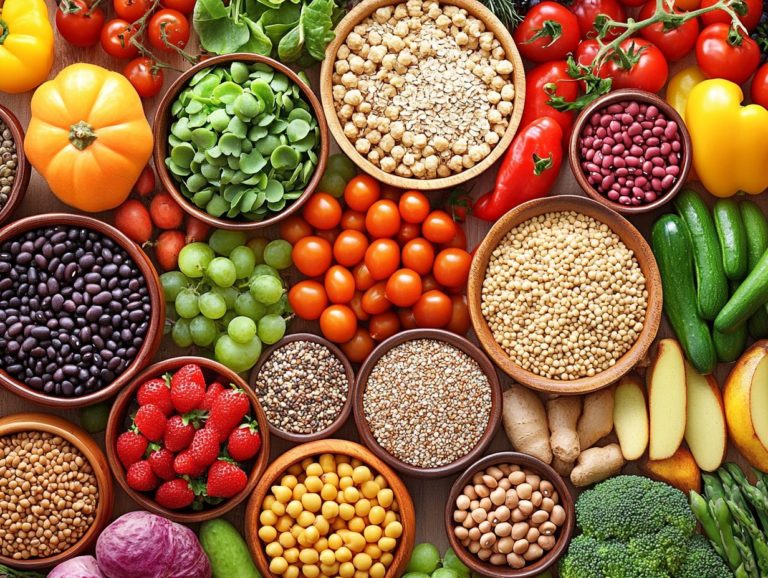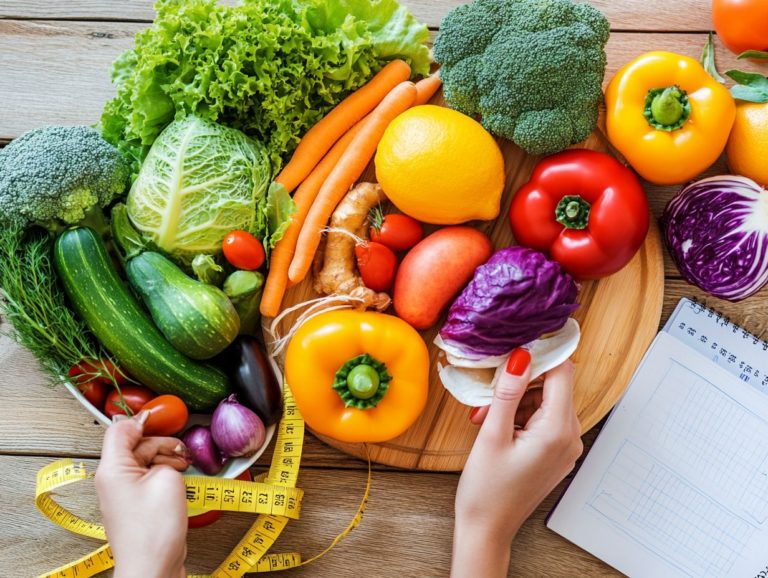How to Address Emotional Eating with Nutrition?
Emotional eating is a struggle that resonates with many people, typically fueled by feelings rather than genuine hunger.
Let s dive into understanding emotional eating it s crucial for your well-being! This exploration delves into the definition and underlying causes of emotional eating, illuminating how your food choices can profoundly affect your mood and cravings. It offers practical strategies to combat emotional eating, including mindful eating techniques and healthier alternatives.
You ll find guidance on crafting a balanced diet, underscoring the significance of seeking support and professional assistance. Discover how to nourish both your body and mind as you navigate this journey.
Contents
- Key Takeaways:
- Understanding Emotional Eating
- The Impact of Nutrition on Emotional Eating
- Strategies for Addressing Emotional Eating
- Creating a Balanced and Nourishing Diet
- Seeking Support and Professional Help
- Frequently Asked Questions
- What is emotional eating and how does it affect our nutrition?
- How can I identify if I am an emotional eater?
- What are some healthy ways to address emotional eating with nutrition?
- Can certain foods or nutrients help with emotional eating?
- What are some ways to avoid emotional eating triggers?
- Should I seek professional help if I am struggling with emotional eating?
Key Takeaways:

- Emotional eating is defined as using food to cope with emotions and can be triggered by stress, boredom, or other factors.
- Nutrition plays a crucial role in managing emotional eating, as certain foods can affect mood and cravings.
- Strategies for addressing emotional eating include finding healthy alternatives, practicing mindful eating, and creating a balanced and nourishing diet.
Understanding Emotional Eating
Emotional eating is a complex behavior in which you find yourself reaching for food in response to emotions rather than genuine physical hunger. This often spirals into an unhealthy cycle dominated by the allure of comfort foods.
It can emerge from a range of emotional challenges, such as stress, depression, and anxiety, as you turn to food for solace, seeking to soothe feelings of guilt and shame or to find a fleeting escape from life’s pressures.
Over time, this can create a significant disconnect between your emotional needs and nutritional requirements, ultimately impacting both your mental health and eating habits.
What is Emotional Eating?
Emotional eating is when you find yourself reaching for food in response to your feelings rather than actual hunger. This behavior can be triggered by a variety of emotions, such as stress, depression, or anxiety.
During tough times, it’s common to seek comfort in food, transforming meals into ways to handle stress instead of sources of nourishment. Unlike physical hunger, which typically creeps in gradually, emotional hunger can strike suddenly, demanding immediate fulfillment.
This often leads to unhealthy eating habits, as you might choose high-calorie comfort foods to ease your emotional distress. As time goes on, relying on food to manage your emotions can complicate your relationship with eating.
You may grapple with feelings of guilt and shame afterward, which can further amplify your emotional challenges.
The Impact of Nutrition on Emotional Eating
Nutrition holds a pivotal place in the realm of emotional eating. The choices you make regarding food can profoundly influence your mood and the intensity of your cravings. This often leads to a reliance on comfort foods, which may offer only fleeting relief from emotional distress.
By understanding this connection, you can make better food choices. These choices can nurture both your body and mind.
How Food Choices Affect Mood and Cravings
Your food choices significantly influence your mood and cravings. Certain unhealthy foods can amplify emotional challenges, while others may foster a more positive state of mind.
By grasping how your body reacts to various nutrients, you can discover a path to improved mental health. Whole grains, fruits, and lean proteins provide essential vitamins and minerals that help stabilize blood sugar levels, which can reduce feelings of anxiety and irritability.
Conversely, frequently indulging in comfort foods high in sugar and fat might offer fleeting pleasure, but this often leads to mood swings and heightened stress. Recognizing the psychological ties behind these food choices underscores the importance of selecting healthier options.
Not only do they support your physical well-being, but they also cultivate emotional resilience, ultimately enriching your overall life satisfaction.
Start making small changes today your mood and health will thank you!
Strategies for Addressing Emotional Eating

To effectively tackle emotional eating, you can embrace a range of strategies that encourage healthier coping mechanisms. Consider practices like mindful eating and strengthening your self-control.
These approaches can transform your relationship with food, turning consumption into a more intentional and enriching experience.
Healthy Alternatives to Emotional Eating
Finding healthy alternatives to emotional eating means pinpointing comfort food options that can satisfy your cravings without sacrificing your well-being.
By exploring various nutritious substitutes, you can transform traditional comfort foods into choices that delight your palate and enhance both your mental and physical health. For instance, swap creamy mac and cheese for a protein-packed quinoa dish topped with vibrant steamed broccoli. This combination brings warmth and nourishment in one delicious bite!
Instead of reaching for sugary desserts, try frozen fruit bars or a piece of dark chocolate! These options are delicious and keep refined sugars at bay.
These thoughtful adjustments enable you to meet your emotional needs through food while nurturing a healthier relationship with what you consume. Ultimately, this boosts your food satisfaction and emotional awareness.
Mindful Eating Techniques
Mindful eating techniques invite you to cultivate emotional awareness around your eating habits, fostering self-control and a deeper connection to the food you consume.
These practices help you uncover the underlying triggers of emotional eating, like stress or boredom, that often cloud your judgment and lead to less-than-ideal food choices. These strategies enhance your emotional intelligence and guide you toward a more intentional approach to meals.
As you learn to tune into your cravings and feelings, you’ll find yourself making healthier choices that resonate with your true needs instead of giving in to impulsive urges.
This journey toward better eating habits nurtures a positive relationship with food, ultimately enabling you to take charge of your well-being.
Creating a Balanced and Nourishing Diet
Crafting a balanced and nourishing diet is crucial for managing emotional eating while addressing both what your body needs and emotional fulfillment. This approach enables you to break free from unhealthy cycles and foster a more harmonious relationship with food.
Incorporating Nutrient-Dense Foods
Incorporating nutrient-dense foods into your daily meals is a fundamental step in establishing a balanced diet that nurtures your body and enriches your emotional well-being.
- Leafy greens
- Vibrant berries
- Crispy nuts
- Fatty fish (like salmon)
These foods are packed with essential vitamins and minerals vital for optimal brain health. For example, the omega-3 fatty acids found in salmon a type of healthy fat that is good for your brain and mood can significantly enhance your mood regulation. The antioxidants in berries combat oxidative stress, often linked to anxiety and depression.
By emphasizing these dietary choices, you don t just meet your needs; you also learn to manage food cravings more effectively. Focusing on whole foods brimming with nutrients allows you to reduce your reliance on sugary or processed snacks, guiding you toward healthier coping mechanisms for emotional triggers.
Start your journey to a better relationship with food today!
Meal Planning for Emotional Eating

Meal planning serves as a proactive approach to tackle emotional eating. It enables you to make healthier choices and sidestep impulsive bites from emotional triggers.
By dedicating time to plan your meals for the upcoming week, you create a framework that minimizes the temptation to seek comfort in food during stressful moments. Adding a food diary to this routine is an invaluable tool for cultivating emotional awareness.
This diary allows you to track cravings alongside the feelings tied to them. Recognizing these patterns helps identify your triggers and deepens your understanding of the complex connection between emotions and eating habits.
This insight is a significant step toward developing healthier coping mechanisms and establishing lasting emotional support.
Seeking Support and Professional Help
Seeking support and professional help is an essential step for anyone grappling with emotional eating. Engaging with therapy services and support groups provides essential resources, enabling you to cultivate emotional intelligence and develop effective coping mechanisms.
Therapy and Counseling Options
Therapy and counseling options offer you a secure space to delve into the emotional triggers behind your eating habits. This nurturing environment promotes emotional coping strategies that enhance your mental well-being.
In this encouraging environment, a variety of methods can be utilized. For instance, cognitive-behavioral therapy (CBT) helps you identify and challenge unhelpful thought patterns, while mindfulness-based approaches cultivate your present-moment awareness.
Group counseling sessions also provide a platform for shared experiences, allowing you to learn from others and feel less isolated in your journey. Professionals may employ motivational interviewing techniques to bolster your commitment to change, helping you recognize your behavioral patterns.
This support helps you understand the psychological roots of emotional eating and guides you on your path toward personal growth and healthier relationships with food.
Support Groups and Resources
Support groups and resources offer you a vibrant sense of community as you navigate the complexities of emotional eating. You can find shared experiences and collective strategies that guide you toward healthier coping mechanisms.
These gatherings create a safe haven for you to openly discuss your challenges, celebrating triumphs and exchanging tips that have proven beneficial on your journey. Numerous organizations, like the Emotional Eating Support Group and the National Eating Disorders Association, focus on emotional well-being, providing tools tailored specifically to your needs.
Online forums and local meet-ups not only help you forge meaningful connections but also encourage self-acceptance and understanding key ingredients for initiating positive change. Don’t wait take the first step toward healthier eating today!
Frequently Asked Questions
What is emotional eating and how does it affect our nutrition?

Emotional eating is a type of eating behavior driven by emotions rather than physical hunger. It often involves using food as a coping mechanism to deal with stress, depression, or other emotions. This can negatively impact our nutrition, leading to overeating or choosing unhealthy foods.
How can I identify if I am an emotional eater?
Some signs of emotional eating include eating when you’re not physically hungry, using food as a reward or comfort, feeling guilty or ashamed after eating, and using food to cope with emotions. It’s important to pay attention to your eating patterns and emotions to determine if you are an emotional eater.
What are some healthy ways to address emotional eating with nutrition?
Mindful eating is an effective way to address emotional eating. It means paying attention to your hunger and fullness cues, and enjoying the taste and texture of your food.
Find alternative coping mechanisms too. Exercise, writing, or talking to a friend can help manage emotions without food.
Can certain foods or nutrients help with emotional eating?
While no specific food can completely prevent emotional eating, a well-balanced diet can help regulate your mood. Foods rich in healthy fats, like those found in fish and nuts, along with B vitamins and antioxidants, support better mental health.
What are some ways to avoid emotional eating triggers?
Identify your emotional eating triggers. These can include specific emotions, situations, or environments.
Once you know your triggers, you can work on avoiding them or create a healthy coping plan.
Should I seek professional help if I am struggling with emotional eating?
If emotional eating is affecting your life, don t hesitate to get help! A registered dietitian or therapist can provide personalized support and guidance to help you build a healthy relationship with food.






